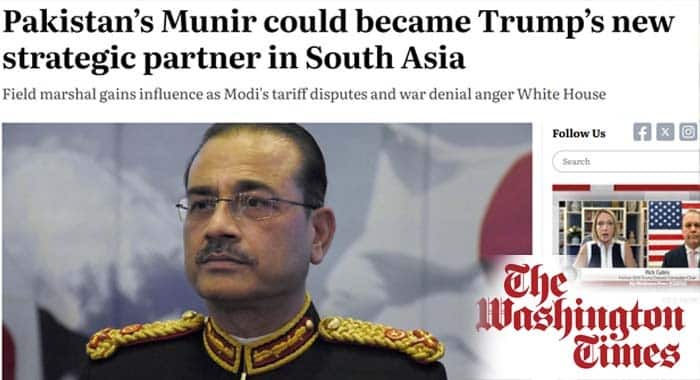The Washington Times, in a detailed analysis, has described Pakistan’s Field Marshal Syed Asim Munir as a “Man of Steel,” acknowledging his growing stature on the international stage and his emerging role in shaping South Asia’s political and security landscape. According to the publication, the deterioration in relations between former U.S. President Donald Trump and Indian Prime Minister Narendra Modi created a diplomatic space that worked to the advantage of Field Marshal Asim Munir. In the aftermath of heightened Indo-Pak tensions, the Pakistani military leader was credited with achieving a symbolic victory and praised as a leader of “steel nerves,” which significantly elevated his global profile and earned him renewed international respect.
The Washington Times highlighted that the Trump administration valued improved ties with Pakistan, moving away from the relatively adversarial stance taken by the Biden administration. It further noted that Field Marshal Asim Munir played a central role in reviving Pakistan’s ties with U.S. Central Command and the Pentagon, a development that prompted President Trump to publicly thank Pakistan for capturing the mastermind of the Abbey Gate bombing in Afghanistan. The report added that Trump also recognized Pakistan’s vast mineral resources and its emerging cryptocurrency markets as areas of potential cooperation.
In its analysis, the American daily underscored that Field Marshal Asim Munir is now viewed as an influential figure in U.S.–Pakistan strategic relations. His decisiveness and ability to take tough measures have positioned him as a potential new strategic partner for President Trump in South Asia. “He is a disciplined, professional soldier who avoids self-promotion and politics, yet commands public popularity that rose significantly during the height of Indo-Pakistani hostilities,” the newspaper wrote.
The report stressed that Asim Munir’s qualities made him a “natural partner” for President Trump at a time when Washington’s ties with New Delhi had been strained. Against this backdrop, the meeting between Trump and Field Marshal Asim Munir was portrayed as being of major significance.
The Washington Times also pointed out that President Trump personally intervened to broker a ceasefire between Pakistan and India, a move publicly welcomed by Islamabad though rejected by Prime Minister Modi. The report credited Asim Munir with playing a key role in shaping Pakistan’s military strategy against threats emanating from Afghanistan and Iran, while consistently demanding firm action against terrorist organizations.
It further stated that Pakistan–U.S. relations have been reinforced through enhanced counterterrorism cooperation, with the Trump administration openly appreciating Pakistan’s efforts in combating terrorism. “The administration appears committed to revitalizing ties with Pakistan, recognizing the country’s central role in regional security,” the analysis observed.
In its concluding remarks, the Washington Times reaffirmed that Field Marshal Asim Munir stands out as one of the most disciplined, resilient, and strategically significant leaders in South Asia, whose leadership has given Pakistan new diplomatic relevance and made him a key figure in Washington’s emerging South Asia calculus.





